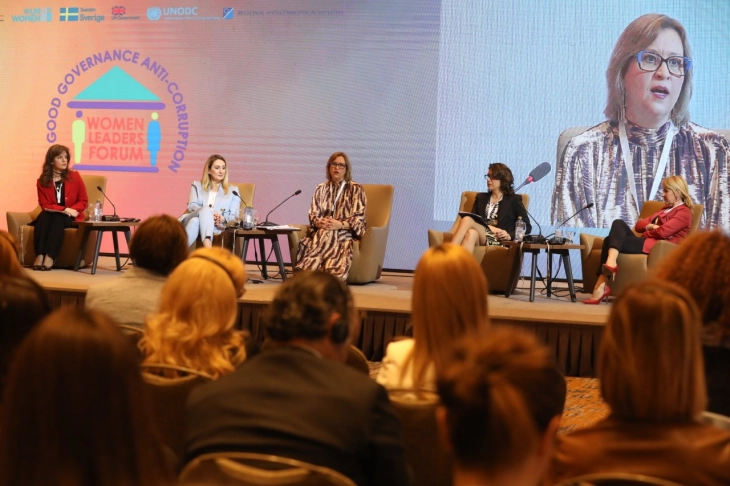Declaration of women leaders for good governance and anti-corruption in South-East Europe signed in Skopje
- Empowering women in politics, strong leadership, networking and gender equality were in the focus of the South-East Europe Good Governance and Anti-Corruption Women Leaders Forum, held Thursday in Skopje.
- Post By Nevenka Nikolik
- 12:54, 23 March, 2023

Skopje, 23 March 2023 (MIA) – Empowering women in politics, strong leadership, networking and gender equality were in the focus of the South-East Europe Good Governance and Anti-Corruption Women Leaders Forum, held Thursday in Skopje.
A Declaration of women leaders for good governance and anti-corruption in South-east Europe was signed at the event initiated by the Deputy Prime Minister in charge of good governance policies, Slavica Grkovska, and supported by the United Nations Entity for Gender Equality and the Empowerment of Women (UN Women), the Regional Anti-Corruption Initiative (RAI) and the United Nations Office on Drugs and Crime (UNODC).
Deputy PM Grkovska said that good governance is crucial when it comes to building trust between the citizens and their institutions, but also for the relations between countries.

“By establishing this forum, this new regional network, we want to highlight the values and advantages of cooperation and solidarity between women, and at the same time send a message that we are open for partnership with everyone that is committed to the principles of good governance,” said Grkovska.
The U.S. Ambassador to North Macedonia, Angela Aggeler, said that women inspire change and they are the ones that transform the conversation during conflicts.

“In North Macedonia and beyond, now more than ever, we need strong and honest leadership in the fight against corruption and the promotion of good governance,” said Aggeler.
The OSCE General Secretary, Helga Maria Schmid, said that it is critically important to empower women in politics so that their rights can be recognized and strengthened and so as to allow them to promote and shape effective good governance and the fight against corruption.
“It’s not enough to be present, we have to stop thinking about how to include women in conversations, women leaders can and should lead the conversations,” said Schmid.

The head of UN Women in North Macedonia, Vesna Ivanovikj-Castarede said that corruption and gender inequality are closely connected and that corruption worsens gender inequality.
“The effects of corruption are different when it comes to different genders, and with enough evidence we are able to provide the policymakers with information aimed at forming good practices in the fight against corruption,” said Ivanovikj-Castarede.
Ivanovikj-Castarede said that greater participation of women in public and political life can help design gender-based approaches to anticorruption thereby preventing women from being victims of corruption and empowering them if that happens.

The Head of Secretariat at the Regional Anti-Corruption Initiative, Desislava Gotskova, said that her intention is to initiate a broader public debate and inspire thorough research and dialogue on all these issues.
“By bringing together women leaders from the entire region we encourage women of all ages to participate in policymaking thereby raising the voices of women and their perspective and the promotion of regional cooperation,” said Gotskova.
The Crime Prevention and Criminal Justice Officer at the UNODC, Jennifer Sarvary Bradford, also stated that women can help mitigate the risks of corruption through their leadership.
Two panel discussions will be held as part of the event – “How women’s leadership can positively affect good governance and democratic development in the region?” and “Women in civil society and investigative journalism – a key link in building a better society for all”. ad/nn/







